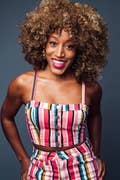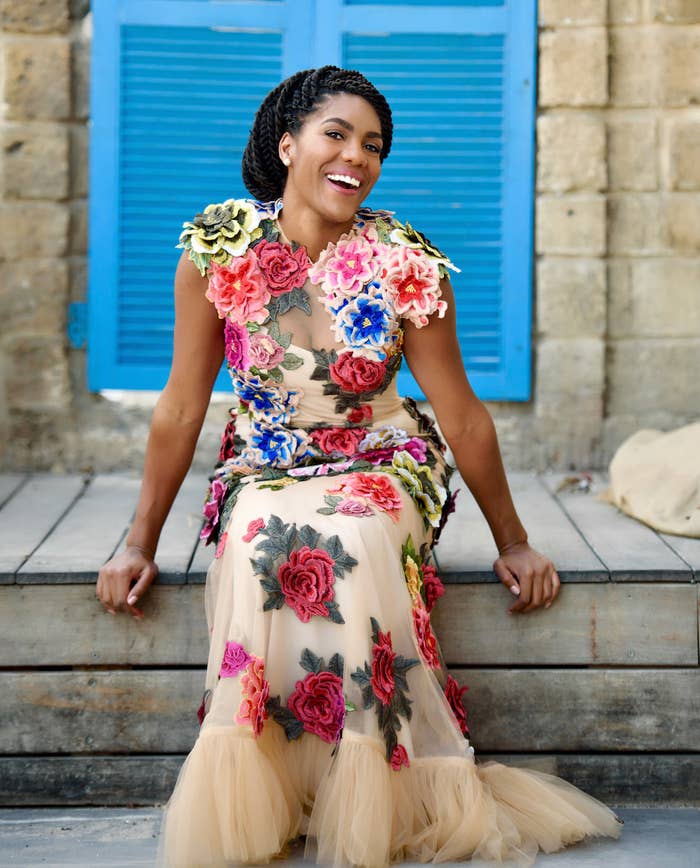
Opera singer J'Nai Bridges tells me she's calling from a New York City coffee shop, fresh cup of tea in hand. In a few days, she'll be ticking off a major bucket list item—performing solo at the legendary Carnegie Hall music venue—so naturally she's excited and grateful and nervous. But she's also ready. "It's so cliché, but dreams really do come true," Bridges said. "I've been going to Carnegie Hall since I was in college and I've been to many recitals and concerts there. I dreamed that I would one day be on that stage and kind of put it into the universe and it's happening."
The 31-year-old has dedicated her life to singing, so it certainly makes sense that "it's happening." However the universe does deserve some credit. Because before earning both a bachelors and masters degree in music and embarking on an award-winning international operatic career, Bridges was a multitalented teenager pursuing both classical voice and basketball at her Tacoma, Washington high school. One fateful night a rehearsal for her very first opera — Puccini's Tosca — fell on the same night of a final round during her team's final basketball tournament. And even though Bridges was able to miraculously make it to both events on time (two-hour driving distance be damned), her coach still benched her—a team captain—the entire game. "He refused to play me because he said I was a bad sportswoman and that I wasn't committed to my team because I had decided that I wanted to go to this rehearsal [too]," she said, recalling her mother's frustrated screams from the stands.
The traumatic event ultimately led the high-performing student to choose her music scholarships over her basketball ones. "It was kind of just like, a really sobering moment where at a young age I had to say, 'Okay, what do I really want to do?' And I was so [new] to singing, I really didn't know what I was doing. But I knew that this was a feeling that I needed to pay attention to and just see what it was all about. And so I did and I think I made the right decision." There you have it, folks: when the universe talks, Bridges listens. Then, she harnesses the brilliant, full-bodied force that is her mezzo-soprano and she sings: European classics; negro spirituals; American contemporary, all of which she'd continue on to showcasing before a sold-out audience in Carnegie's 127-year-old Weill Recital Hall last Thursday evening. "When I stepped foot on the stage I felt a flood of emotions. It felt like home, being on the stage," Bridges told me in a recent email. "Also I know I was probably imagining this, but it was as if there was an extra glow around the whole hall. It’s as if it was welcoming me and saying “Well done, J’Nai, you have worked very hard. Welcome to your stage.”
With one dream down, the in-demand singer's got many more to go in 2019, starting with international debuts at the Dutch National Opera, the San Francisco Opera, and the Gran Teatre del Liceu. She also has dreams of making opera more accessible to everyone and inspiring audiences to live their best lives, two presumably unimaginable things that seem way more possible after you've heard J'Nai belt out "Ô ma lyre immortelle" on YouTube. If you're reading all this thinking Okay, this is all well and good but I know nothing about this music, you're not alone. As someone with absolutely no knowledge of the opera or the performances myself, I spoke with J'Nai about the genre's lasting relevance, the difference between singing pop and singing opera, and the seriously gorgeous gowns.
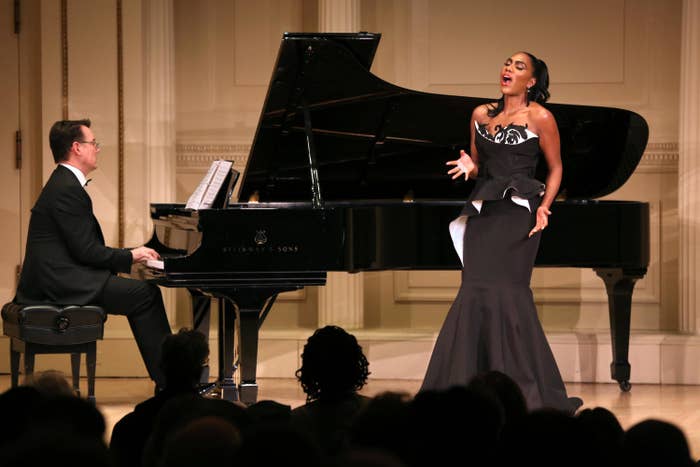
I think that opera might seem very exclusive and antiquated to most people who aren't familiar with the genre. What role do you think opera plays in our society today?
Opera has a history of being very closed off, but I think that's definitely changing.The actual music of opera is very accessible but I think we've got to make it more accessible to everyone, and I see in opera companies all around the country and the world that an effort is being made for that to happen. Opera is quite relevant, actually. Have you ever been to an opera?
I have, when I was younger...
Okay! Yeah, the themes in opera, they never die, basically. It's love. It's death. It's jealousy. It's forgiveness. I think opera is one of those art forms that will always carry people away and be relevant. It's not always easy to understand, but there are definitely functions that help with that understanding. For instance, there are subtitles in an opera, so it might be intimidating to hear this opera in French or in German or Italian, but there are translations. I think it's a really cool thing. It can be intimidating but part of my job is to expose people in my community, our community, to opera.
I often go out to schools and actually talk about what I do. And I'll sing a little bit or show them a clip of an opera and just open up people's minds. That's probably the hardest, the biggest challenge, you know? But once people do that, it's like, 'Oh my gosh, this is so cool! I had no idea.' I would say that it's an art form that will always be relevant, no matter who you are. I think it can be applied to anyone. The last opera that I did, Satyagraha in Los Angeles, was about Gandhi and his kind of journey. And the feedback from that opera, I mean, people walked out just thinking about how they'd be better. And for me, that's a huge part of what I do. That's also what I want people to think about when they leave my recital. What can I do to just be better? And, [opera] also gives hope to people. I think it inspires. It's a very inspiring art form.
View this video on YouTube
Bridges sings 'O ma lyre immortelle' from Sapho by Charles Gounod, at BBC Cardiff Singer of the World 2015.
In what ways is singing opera music different from singing pop music, professionally speaking?
Well, first of all, I thinks it's important to emphasize that being an opera singer is NOT more demanding or more difficult than being a pop singer. The two [genres] are different kinds of difficult [and they're both] demanding. Opera singers don't use microphones, so we've trained for years and years and years to fill a 3,000-seat opera house with our voice. So I would say that's a huge difference. We sing in many different languages, which you know, takes a lot of discipline to learn and feel the languages and the diction. And I don't know the life of a pop star, but I know the life of an opera singer, and because we aren't amplified in any way, we have to be very conscious and careful about our instruments. We have to be very careful about the two chords that make up our vocal chords and that includes our lifestyle. I think that should apply, actually, to everybody. Doing the right things for your body and not abusing your instrument.
Those are really good points! I always thought opera singers had the little head mics that you see actors wear in musicals and plays...
We're not amplified, so rest is very important, because honestly, it feels like sometimes I've just played a basketball game or run a marathon because it's a whole body endeavor and it's great. You know? It feels like, Wow, I did that with my body! There are different levels. I would love to incorporate some of the lifestyle of a pop singer, though. Actually, I have to tell you, a dream of mine is to collaborate with Beyoncé or Rihanna. Because why not, you know? It would expose their people to opera and I love pop music. I love all music, but I think that it's not actually so different. And I think that people have this big division in their minds. But it's really very similar. You go to a concert and you feel good and the music takes you to a different place and you can shed all of your worries, basically. That's the beauty of music, in whatever art form. Entertainment.
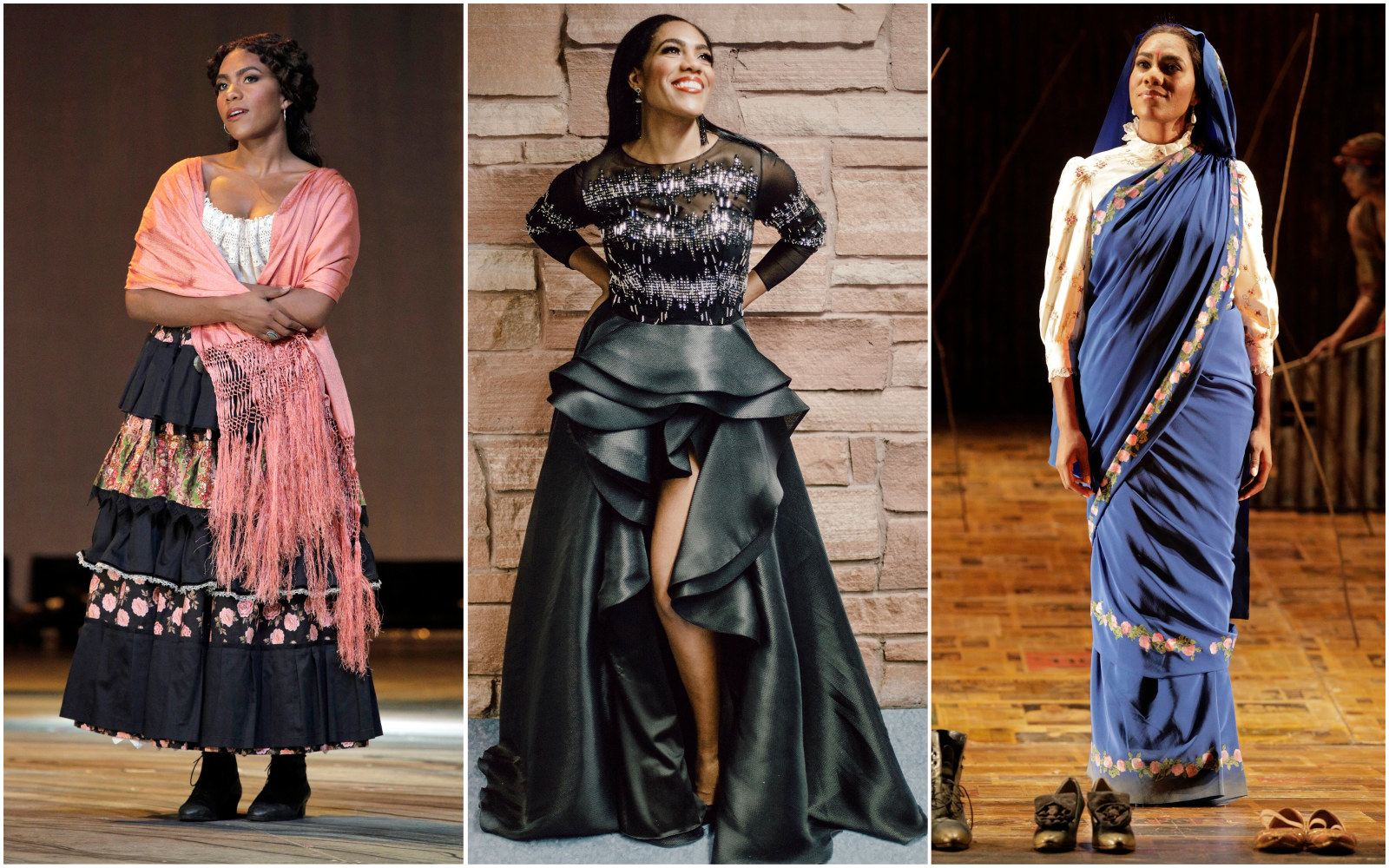
I have to ask you about all of gorgeous outfits and the beauty looks that are part of your job as an opera singer. Talk about that a little.
I feel very lucky in that I get to wear gowns for a living. I've always loved to play dress up since I was little girl. I mean, I was kind of a tomboy, a baller, but at the same time, I loved to get dressed. In the beginning of my career my mom would buy gowns for me — and she has a great eye — so I just always watched her and then we started to collaborate. Kind of like Beyoncé and her mom, except my mom didn't create. But she just had the eye. So then I started buying gowns in whatever city I was in, just keeping my eye open. I literally get them from all over the world and I just love it.
And that doesn't necessarily mean gowns [only] because I have many pantsuits as well. I just really have a passion for fashion. And it makes me feel good. And I love using that creative aspect of myself. There are some ways in which I'm totally not creative, but I definitely feel that I have a gift for wardrobe in general. People ask me all the time, "Will you please help [me find a gown]?" And I love it because everyone loves to feel good, especially when they're presenting themselves singing on stage. It's part of the whole presentation. I just love it!
What are some challenges that you've faced in the opera world?
That's a good question and I've thought about this. So I can start by saying that I actually have not felt directly any challenges related to my race. I don't know if it's actually happened, but I haven't felt that, which I'm very fortunate and very grateful for. It does not mean that it doesn't exist. That's for sure. But for me, I'm finding that the biggest challenge is just the traveling. Basically I move every two months. It's a lot. Traveling and then staying up to par vocally. So while I have many ways to stay healthy, it's difficult to sleep in different beds, and singing and being in different environments with different sounds. But you find your ways to make every place home.
And then there's also just like, balance. Balancing work with play. I love what I do, I really do and it actually doesn't feel like work most days. But in terms of giving attention to other things that aren't my job — friends, family, relationships — it's a bit of a challenge. But you make it work. I'm making it work as best as I can. It's definitely not something that's always easy.
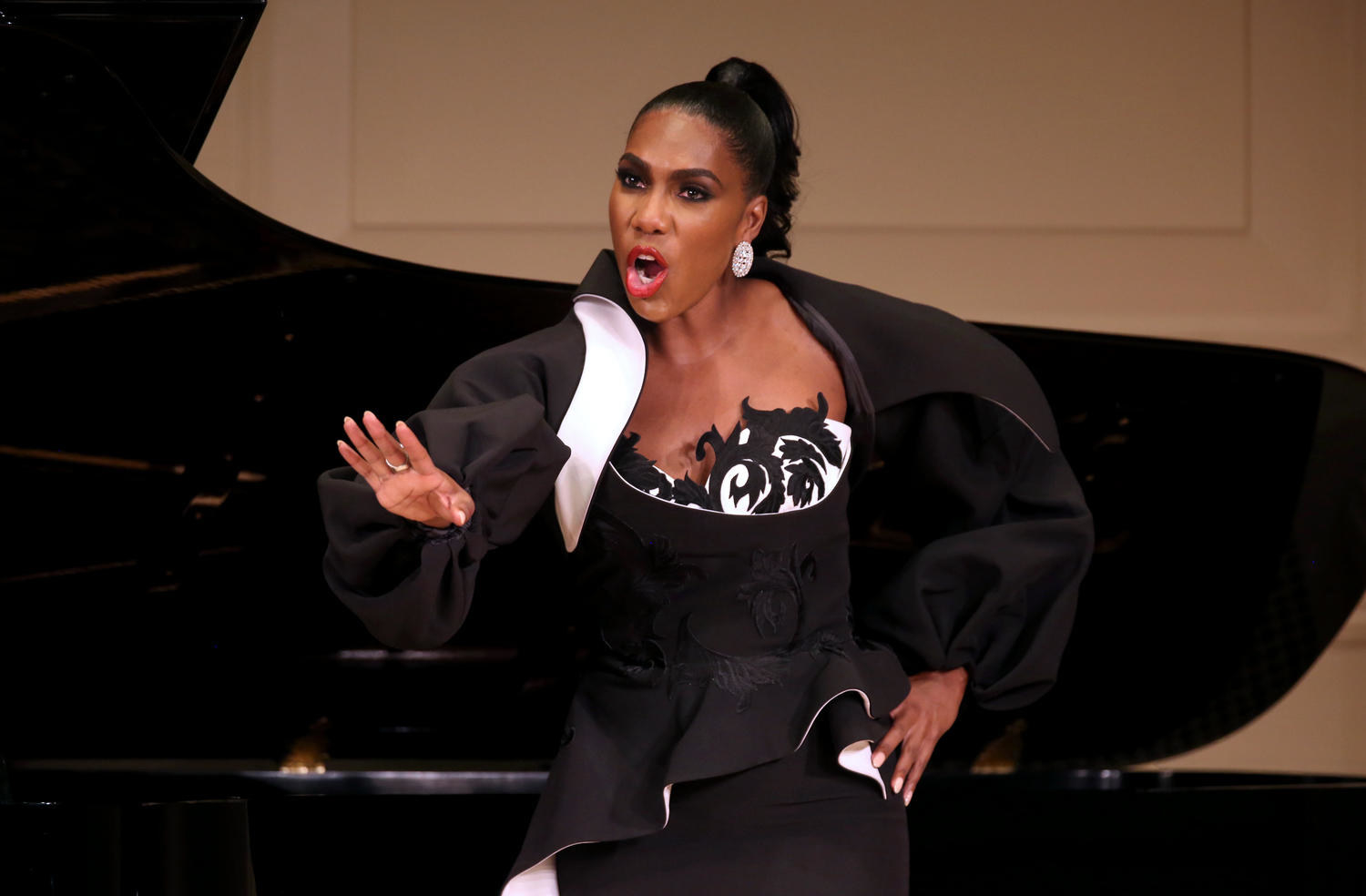
And what advice do you have to aspiring vocalists and particularly opera singers, but also just performers in general?
I think the biggest piece of advice I have is to know that someone's opinion is not the truth, it's an opinion. And as a performer, you're always being critiqued and criticized and some of it you take and some of it you leave, but you have to know that it does not define you. And whatever art form you're doing, that doesn't define you either. It's like icing on top of a cake. If you do let it define you, that's a lot of up and down. Like if you don't get the job or if something goes wrong, of course there's going to be disappointment, but if you make that [art form] who you are, then it really can get pretty dark.
Also, I just think in general, people don't realize that they can do and be anything that they want to be and it all starts with an open mind and the acceptance of yourself. So, I always tell young people when I speak to them, I mean, Beyonce's Beyonce. Rihanna's Rihanna. Celine Dion is Celine Dion. Usher is Usher, whatever. But you are you. And that is awesome. Don't try to be anybody else. Be your beautiful self. In the beginning of my career, I was trying to be this person and that person and it was just not really working. But then when I accepted the fact that this is my voice I realized, Wow, I am awesome! Things just really started to open up and really take off. Because that's what people want to see. They want to see who are you and what you have to say. So I tell people to say that and do that and be you. We're all really special in our own ways, you know?
Anything else you'd like to add?
I hope people will just take a step or a leap and go to an opera and listen to it, because it's probably something that is very different than what people actually expect. I've spoken to a lot of people and they think this is for only rich white people, and it's just not the truth, you know? So I'm singing a lot of big engagements in major opera houses and one of my goals is really just to get everybody out and to get the audience to represent who we are, like the country.
This interview has been edited for length and clarity.
To learn more about J'Nai Bridges and her 2018-2019 performance schedule, visit her website and Instagram.
